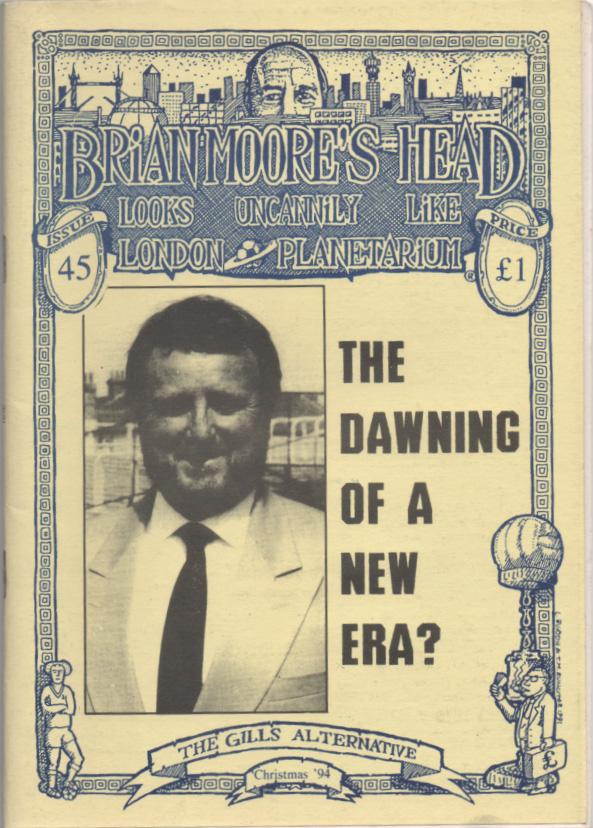Nicky Forster was featured on the cover of BMH for the second time in three editions when he graced the front page of issue 42, published on the opening day of the 1994-95 season, when Gills were held to a goalless draw by Hartlepool.
In BMH40, the fanzine had urged the striker to sign the contract he had been offered and remain with the Gills. By the time BMH42 came out, Forster, leading goalscorer with eighteen league goals the previous season, had left the club and joined Brentford, leaving the publication wondering just where the goals were now going to come from, but providing consolation with the headline, ‘Still, at least we’ve got a defence.’
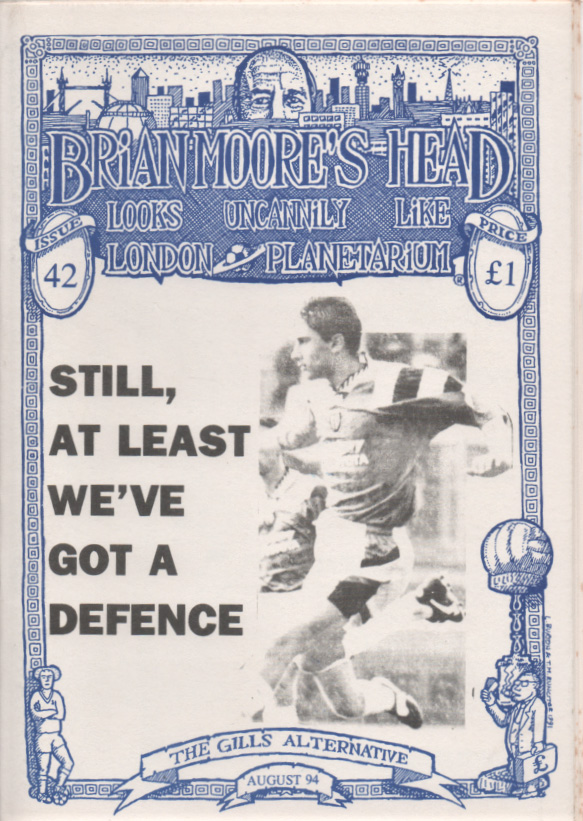
BMH41, from the end of 93-4, had apologised for the tone of the fanzine having been ‘a bit too depressing this season’, but BMH42, even though it appeared before a ball of the following campaign had been kicked in anger, was very downbeat. The editorial included, ‘Normally as the new season approaches, talk amongst Gills fans is of how optimistic, or, more often, pessimistic, they are feeling.
For me, the run up to 1994-95 has been entirely different. I haven’t been feeling either of these emotions, just a total lack of enthusiasm. Whereas I would normally be positively gagging for the season to start by about mid-July, I now find myself in the unusual, if not unique, position of not actually wanting the season to start at all.’ A similar view was aired by the writer of an article entitled ‘Pictures of you inside my head’, who described his attitude to Gillingham as ambivalent.
The author was ‘not exactly disillusioned, more resigned to the inevitable, dreary, depressing frustrations posed by another year of mediocrity at best. Priestfield is falling down and, along with the crumbling, rusting spiritual home is the battered and bruised soul of the Gills. Our name no longer carries any clout in the lower divisions, the Rainham End “roar” is often sadly muted and the remaining hardcore support is understandably a touch cynical. Now I don’t blame the team, nor the current management, administration or support. It has just happened and we, the Gills, are not only down amongst the “deadmen”, but also in danger of becoming one of the established stalwarts in the “deadwood society”.’
BMH42 had announced that the next edition would be out at the Scarborough game on 10 September, but the 64-page BMH43 didn’t appear until the visit of Torquay four weeks later, when sales were good, even though there were only 2,439 at the match. It was our sixth home league fixture of the season and we’d only had a crowd in excess of 3,000 on one occasion, 3,015 watching the draw against Rochdale.
The delay in publication was explained in the editorial, ‘It seems like quite a while since the first issue of the season hit the terraces, probably due to the fact that it is quite a while. This longer than expected gap came about due to a combination of two things, a lack of time through work commitments (contrary to popular belief, we do actually have to work for a living) and the fact that we are fed up to the back teeth with writing about such a completely useless football team.’ The side had got off to another poor start, the 3-0 win at Wigan on the second Saturday of the campaign standing out as an apparent blip, and the first real airing of chants for the manager, Mike Flanagan, to be sacked had taken place at Walsall before the end of September, ‘The fact is that Gillingham have once again failed to live up to the expectations of the support. Considering those expectations are about as high as an ant’s testicles these days is quite an achievement.’
The article, ‘Follow your instinct’, gave out a warning to all Gills supporters. It began, ‘If you are anything like me, there are occasions when you just know how Gillingham will perform in a given fixture, and you will have a fair idea what the result will be.’ The writer mentioned the away leg of the Coca Cola Cup first round encounter with Reading earlier in the season.
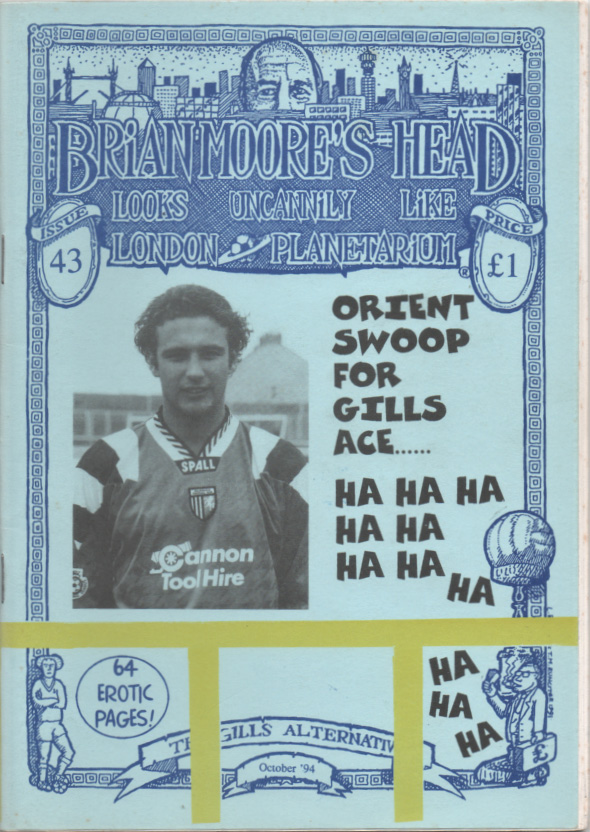
We’d lost the home tie by a 1-0 scoreline and, as far as he was concerned, the Gills were out of it and would go to Elm Park and lose 2-0 or 3-0, ‘probably having strung the Gills support along for half an hour or so by not conceding further goals and maybe even missing a couple of chances. I decided I wasn’t going to bother going to Reading. This is a measure of how far down my personal list of priorities going to Gillingham away games has now fallen, after two or three years when the thought of missing one seemed like one of the worst things that could possibly happen.’ The author didn’t bother with the league game at Wigan, instead choosing local football that day by watching Chatham’s home match against Crockenhill. The Gills won 3-0 but the writer’s stance with regards to the Reading away game remained unchanged, ‘perhaps the enormity of what we’d done at Wigan hadn’t sunk in yet.’
However, the following day, watching the three excellent goals from our romp at Springfield Park on Meridian sowed the first seeds of doubt that perhaps we weren’t that bad and maybe we would give Reading a decent game, ‘maybe if I finish work early I’ll ring up to see if there are any seats left on the coach. Tuesday arrived, I finished work early, I rang up to see if there were any seats left on the coach, there were.
Reading, here I come.’ The Gills made a decent enough start, ‘Even after half an hour of the game, things didn’t look too bad although, to be honest, we didn’t exactly look like we were going for the jugular in a desperate bid to claw back the first leg deficit. However, 0-0 at half time and still in it.’ Jimmy Quinn scored for the home side in the opening ten minutes of the second half to kill the tie and, after Stuart Lovell hit a second for Reading, Quinn scored again, Flanagan’s side going down 3-0 on the night, 4-0 on aggregate, ‘I was left to ponder my own stupidity on the coach journey home. Even so, as Peter Lloyd took bookings for Scunthorpe and Exeter, there was not even the merest flicker of a chance that I was going to say, “Oh alright then, put my name down”.
I had learned an important lesson, and it is this – if it is obvious that the Gills are going to lose a certain game and, for this reason, you decide not to go, don’t be deflected by any sudden 3-0 wins in the meantime. They have no bearing on future results and should be totally disregarded.’
BMH44, another sixty-four page issue, was completed on Wednesday 9 November, sent off to the printers, Juma, in Sheffield later that week and the new edition arrived back in Kent in time to go on sale for the first time at the home game against Chesterfield on Saturday 19 November, which ended in a 1-1 draw, Robbie Reinelt scoring for the Gills. Cover star was director Tony Smith, with the headline, ‘Smith bails out...and who can blame him?’ The editorial included, ‘I have to confess that the news of Tony Smith’s decision to sell his majority shareholding did not surprise me in the slightest.
The first time the Head team met Tony was shortly after the 5-0 victory over Southend in 1989. He was buoyant and seemed genuinely optimistic about the club’s future. Yet, on each occasion I have talked to him since he seemed more pessimistic about the Gills than the last. Indeed, his moods mirrored my own, as the team lurched from poor performance to poor performance.’ With fans wondering what was to become of the club, ‘fortunately, it was not long before (chairman) Bernard Baker stepped into the breach, announced his company was looking to invest £1M and that he was seeking other local businessmen who could put in another £500,000. Bernard Baker was making all the right noises, talking of the importance of getting it right on the field, as well as off, and things suddenly began to look quite rosy.’
The article ‘Oh dear, what can the matter be’ also referred to the financial crisis at the club, ‘Bernard Baker’s most important remark so far had been to say that the next cash injection (hopefully the full £1.5M) has to make a difference this time – he said that it is not enough to just paper over the cracks and he is totally spot on. Tony Smith did a great job propping up an ailing club, paying the bills, covering the wages, keeping us ticking over, but he only succeeded in treading water. Okay, we didn’t drown, but we can’t carry on in the doldrums forever.’ The feature ‘Enough is enough’ also covered the most pressing issue at the club at the time, focusing on Tony Smith, ‘For Smith’s £1m+ investment, what do we now have?
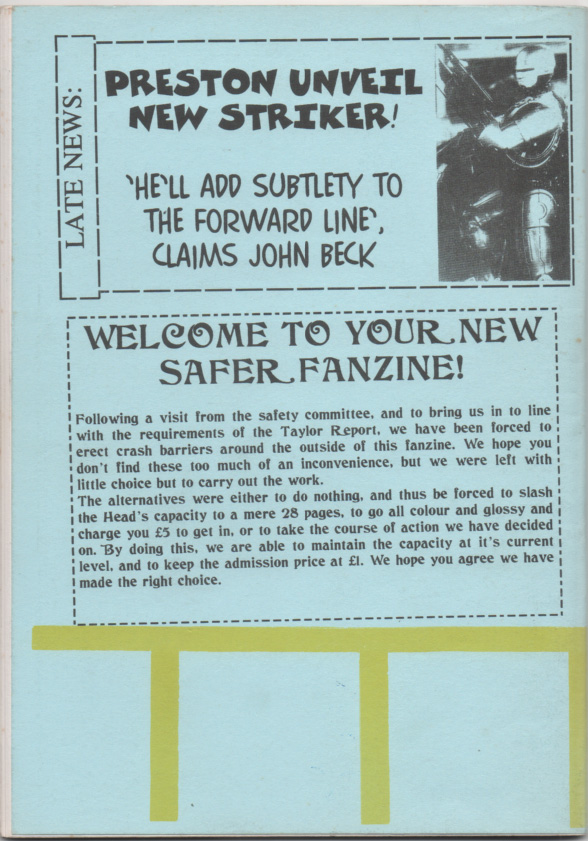
A ground that is crumbling and a team that is struggling. No wonder he has said enough is enough. Who can blame him for not wanting to invest further? There comes a time when you just have to stop. For Tony, that arrived in October.’ The writer’s opinion was that Smith deciding to sell up could be beneficial for the club as it had re-awakened the need for further investment, ‘Maybe Tony’s decision to withdraw has finally provoked a shake-up at Gillingham, where we don’t just potter along, but we actually make positive progress, something which hasn’t happened for many seasons. What we all need now is for Gillingham to have a period of success. After all, we have put up with a hell of a lot of rubbish over the past few years. And Tony Smith, more than anyone, deserves to watch a successful Gills side.’
The final edition of 1994, issue 45, debuted at the Boxing Day home fixture against Fulham, which we won 4-1. On the cover was chairman Bernard Baker, with the accompanying headline, ‘The dawning of a new era?’, the question mark proving to be very significant. The editorial began, ‘As we go to press, it is still uncertain whether Bernard Baker’s proposed takeover will go through, although it does seem likely that it will, despite two prospective backers pulling out. One thing is for sure though, the sooner something positive occurs, something that can pull this football club out of the huge rut it finds itself in, the better for all concerned.
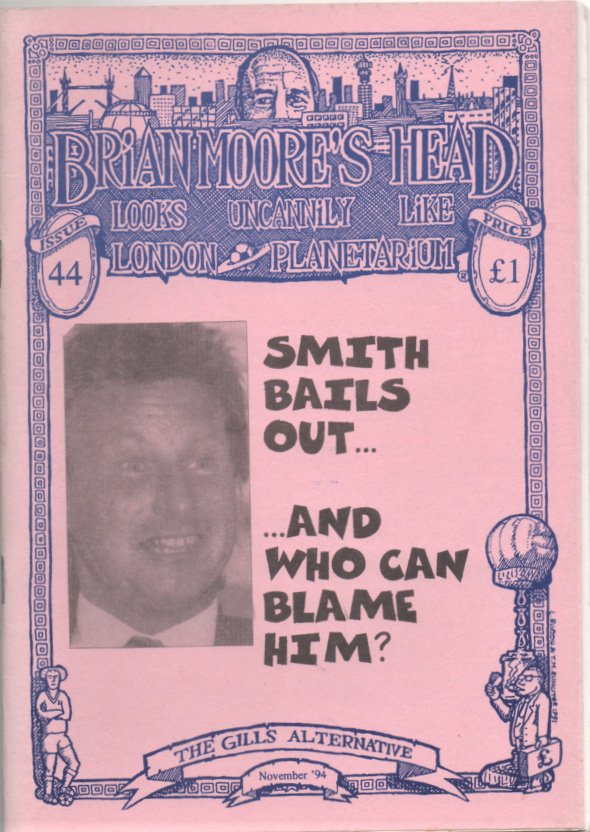
At the moment it feels very much like we’re treading water and, at the rate we’re going, it won’t be too much longer before we start to drown.’ It ended with, ‘If it wasn’t for the fact that I’ve got a season ticket, I sincerely doubt whether I would bother going to all the home matches. Once upon a time I looked forward to games and would turn up believing it was a distinct possibility that I was going to be entertained, if not for the whole game, then at least for half hour or so. But now, all I expect as I walk through the Priestfield turnstiles is another ninety minutes of gloom.’
The article ‘A pointless exercise’ was about the Auto Windscreens’ Shield, a competition that ‘throws up a number of bizarre anomalies in its early stages as it laboriously attempts to eliminate one third of the entrants at the preliminary stage. Teams can face each other in consecutive rounds (and get beaten on both occasions in an identical fashion in our case), whole groups can require replaying and final matches can be restaged with the venues reversed just to see who will be awarded a home tie in the first round proper.’ In 1994-95, goal difference had been dispensed with as to the method of deciding placings when teams finished level on points, instead ‘goals scored’ was used.
With three teams in each group, of which two would progress, the Gills had already drawn 1-1 against Brighton at Priestfield in front of 963 and Brentford had subsequently won 1-0 at Brighton. The final game was our visit to Brentford and there were five permutations; a win would mean finishing top and a home game in the next round, a draw would mean second spot and a subsequent away tie, a 1-0 loss would then require a replay away at Brighton, any other defeat in which Gills failed to score would see us out of the competition, whilst any beating in which we scored would see us qualify in second place. If Gillingham lost 2-0 they would go out, but they’d go though if beaten, say 10-1!
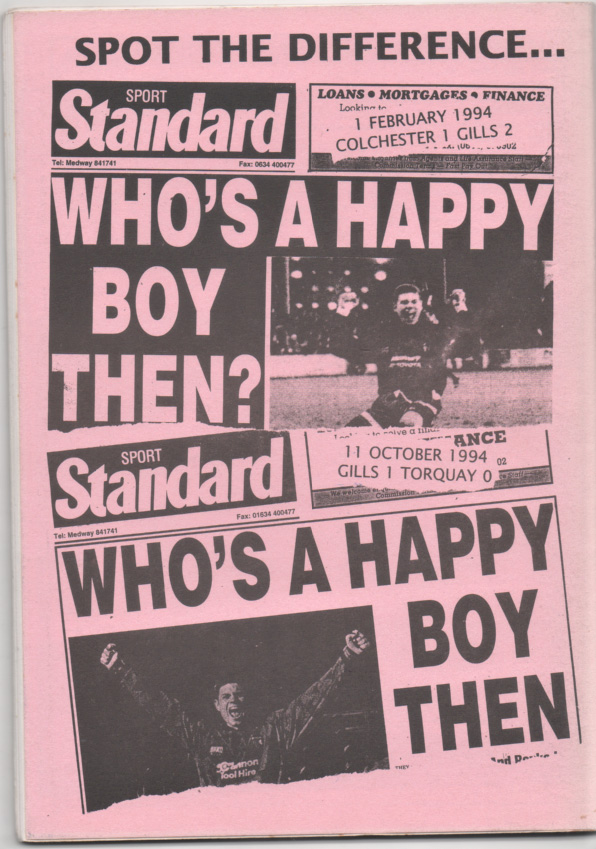
The temptation to play a team of forwards, in search of the one goal required, was resisted. At one stage, we trailed 2-0 but once Chris Pike scored for the Gills, it was all basically academic and a bit pointless. We duly conceded again, but nobody cared and we lost 3-1 but, having managed a goal, were through to face Birmingham at the next stage, who beat us 3-0 in front of a 17,028 crowd, their highest of the season and only slightly less than the combined attendance at the other thirteen ties played that night, the large gate being due to the home side slashing admission prices to five pounds.
BMH45 printed extracts from a Midlands newspaper report of the game, ‘It will take a club of much more substance than up-for-sale Gillingham to deflect them off course. Blues were so much in control of an embarrassingly one-sided affair I stopped logging their goal chances after twenty minutes. The only surprise is that they didn’t reach double figures because they should have done.’
